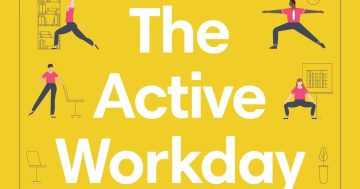Michelle Gibbings* says having habits can be helpful or harmful, so when they influence your workplace performance they need to be kept under strict control.
 When you think of bad habits, what springs to mind? Not getting enough exercise, eating poorly, or watching too much TV.
When you think of bad habits, what springs to mind? Not getting enough exercise, eating poorly, or watching too much TV.
The list can be long.
Mostly the habits we recall are personally focused and outside the working environment.
Yet, just as you can have poor lifestyle habits, you can also have poor work habits.
Much of what we do each day results from habits.
An action becomes a habit when we do it repeatedly — often to the point when we don’t think about it.
The real danger lurks in this space because we may not even realise we are doing it.
Poor working habits can negatively impact our productivity, relationships, reputation, health, and wellbeing.
So, if something at work isn’t working, it can help to step back, pause and reflect, and dig into our work habits to see if they are helping or hindering us.
Here are some tips to get you thinking.
Never having more than a week’s leave
If you burn the candle at both ends — working late, constantly taking work home and always working weekends — you will eventually burn out.
When you aren’t in good shape, your work suffers.
Holidays are not just about having fun.
They are essential for mental health and wellbeing.
During this downtime, you get the chance to reconnect with friends and family and to reflect on life, where you are going and what you want to do next.
Don’t fool yourself into thinking that a long weekend or mini-break is enough.
They are great, but longer breaks (beyond a week) are much better at providing time to rest, recharge and reflect.
Being a meeting junkie
When you rush from one meeting to another you can get to the end of the working day exhausted yet having achieved little.
It’s essential to structure your day, so you get the most important things done first.
Allow time for regular breaks, during which you get away from your desk for at least 30 minutes.
Always being late
When you keep people waiting, you are unconsciously implying that you regard yourself as more important.
A regular pattern of tardiness does nothing to enhance your reputation.
You’ll be known as the person who continually misses deadlines, letting down your boss and colleagues.
Never getting bored
With the busy mantra rushing around in your head, you can easily worry when you have nothing to do.
However, when you are bored or day-dreaming, your best ideas will arise.
In this ‘quiet space’ your brain can wander, ponder and create.
Be deliberate about finding time to do nothing.
Reconnect with nature and spend time outdoors.
Making it too hard for yourself
We are often told we need to set goals, but not just any goals — big hairy, audacious goals.
Yet research shows that setting goals that are too high and too hard inhibits progress.
You are far more likely to progress when you break projects and activities into bite-sized, manageable chunks.
It’s great to be ambitious and set stretch targets, but what’s more important is reliability and consistently good performance.
Saying yes too often
The conundrum is that if you always say ‘yes’, you lose your voice and often the ability to find the balance in your personal and professional life.
A crucial part of avoiding burnout and having the career you want is learning to say ‘no’.
A ‘no’ with conviction and no ‘sorry’ attached to it.
There’s nothing worse than feeling like you are drowning in work and yet are unappreciated as more and more work comes your way.
It’s easy to say ‘yes’ when a request comes in, yet there will be times when you need to say ‘no’.
Being the office energy thief
An energy thief saps you of energy, drains your focus, wastes your time and can throw you off track.
Energy thieves focus on their needs, showing little or no interest in those of other people.
They continuously focus on the negative, seeking to drag others down with them.
Being seen as political, a gossip, or an energy thief will do nothing to endear you to your boss or colleagues.
Always multitasking
When you are multitasking, your attention is split, and as you switch from one activity to another, you lose concentration and ultimately become less productive.
If you are sitting in a meeting and typing an email (or reading this article), you won’t fully concentrate on what is being said.
Each time you switch from one task to another, your brain loses focus and then has to refocus, using up precious resources.
Highly productive people time-box their workday and ruthlessly manage their schedule.
Not getting enough sleep
When your brain is tired, you tend to take the path of least resistance, letting past expectations and assumptions drive your actions.
You’ll decide the way you’ve always decided.
When you are rested, you’ll be better equipped to deal with work pressures, manage a heavy workload and make well-reasoned decisions.
The concept of ‘sleeping on it’, isn’t silly.
You are far more likely to make better decisions early in the morning when your pre-frontal cortex is rested.
So which of these habits do you need to replace?
*Michelle Gibbings is a Melbourne-based change leadership and career expert and founder of Change Meridian. She can be contacted at [email protected].
This article first appeared at changemeridian.com.au











